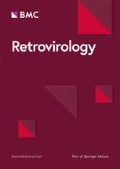Kaposi’s Sarcoma is a vascular tumour caused by the Kaposi’s sarcoma-associated herpesvirus (KSHV). Although KSHV and HIV co-infection is often observed in HIV disease, the majority of patients nevertheless do not develop KS. Innate immunity, and in particular human leukocyte antigen alleles (HLA) and killer cell immunoglobulin-like receptor (KIR) are suspected to play a role in the development of viral associated carcinomas. We verified possible correlations between KIR/HLA complexes and KS by analyzing 82 HIV subjects: 15 with KS (KSpos), 32 KSHV-infected without KS (KSHVpos/KSneg) and 35 KSHV-uninfected (KSHVneg/KSneg); results were compared to those of 103 age-and sex-matched KHSV-seronegative individuals (HC).
Molecular genotyped was performed by Single Specific Primer (SSP) method for HLA class I, and KIR alleles. Chi-square analysis Yates corrected (py) and Fisher exact test (pf) were evaluated when appropriated. Results showed a statistically higher frequency of the activating KIR2DS2 allele in KSpos subjects (93.3%) than either in KSHVpos/KSneg (46.8%, py=0.02), or KSHVneg/KSneg (51.4%,py=0.008) patients, and HC (42.7%, py=0.02). Moreover, the homozygous genotype KIR2DS2+/2DL2- was present in 3/15 KSpos, but in none KSHVpos/KSneg (pf=0.03) or KSHVneg/KSneg (pf=0.02) and only in 1/103 HC (pf=0.006).
Finally there was an higher frequency of KIR2DS2/HLAC-1 functional complex in KSpos (66.7%) than in all the other groups (40.6%, 40.0%, 43.7%, respectively), though not statistically significant.
Results herein, although stemming from analyses performed on a small number of individuals, suggest that HIV and KSHV co-infected subjects in whom activating KIRs and activating KIR-HLA ligands functional complexes are detected, are more prone to develop KS.
Author information
Authors and Affiliations
Corresponding author
Rights and permissions
This article is published under license to BioMed Central Ltd. This is an open access article distributed under the terms of the Creative Commons Attribution License (http://creativecommons.org/licenses/by/2.0), which permits unrestricted use, distribution, and reproduction in any medium, provided the original work is properly cited.
About this article
Cite this article
Agostini, S., Guerini, F.R., Bandera, A. et al. A role for activatory KIR/HLA complexes in HIV-associated Kaposi’s sarcoma development. Retrovirology 8 (Suppl 1), A209 (2011). https://doi.org/10.1186/1742-4690-8-S1-A209
Published:
DOI: https://doi.org/10.1186/1742-4690-8-S1-A209

